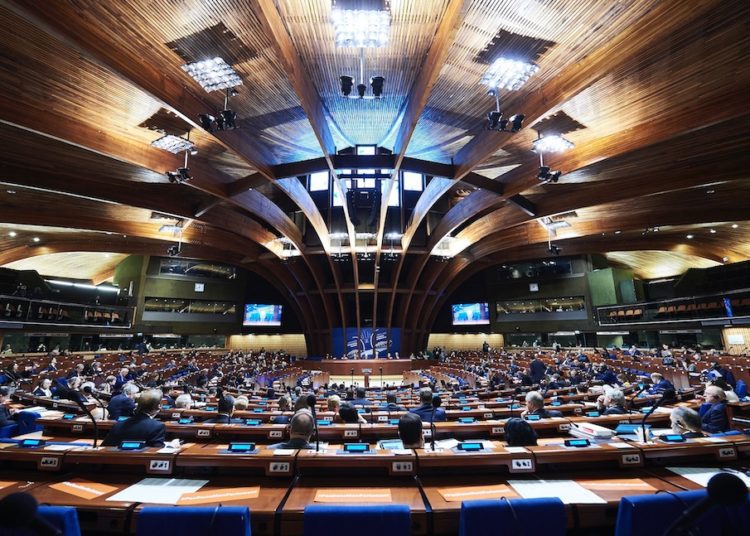Abdullah Bozkurt/Stockholm
In yet another indication that Turkey is distancing itself from core European values, a senior Turkish government official said the country views the mandate of the Council of Europe Development Bank (CEB) to promote human rights, democracy and the rule of law in its financing operations as a hollow effort.
The Turkish government’s stance that the bank’s operating guidelines have nothing to do with the core values of the Council of Europe (CoE), the largest intergovernmental organization championing the rule of law. democracy and fundamental human rights in Europe, was recently disclosed during a parliamentary committee meeting. This revelation comes as Turkey plans to inject additional capital into the bank’s reserves to maintain its influence over the institution’s operations.
Responding to concerns about Turkey’s human rights violations and their potential negative impact on Turkey’s access to funds from the CEB during a debate at the Foreign Affairs Committee on May 27, Kaan Esener, general director of legal services at the Foreign Ministry, said the CEB is not concerned with such matters.
Stating that he served as Turkish ambassador to the CoE for four years and has extensive experience and knowledge of the functioning of the bank and CoE bodies, Esener said, “Whether it is ECtHR [European Court of Human Rights] decisions or other [violation] decisions [against Turkey], the bank is not concerned with them.”
Turkey has been facing a barrage of court judgments, assembly resolutions and critical statements from various CoE bodies in recent years due to widespread human rights violations perpetrated by the government of President Recep Tayyip Erdogan.
Minutes from the Foreign Affairs Committee meeting regarding the injection of additional capital into the CEB:
In a rare action against a member state, the CoE’s top executive body, the Committee of Ministers, initiated infringement proceedings against Turkey in 2022. This was due to Ankara’s failure over the previous two years to comply with a 2019 ECtHR judgment which ruled that Turkey should release human rights defender Osman Kavala and fully restore his rights.
As a result of the infringement proceedings, Turkey may lose its voting rights in the CoE and risk its membership. Turkey is the second country in the council’s history to be subjected to the sanctions process for breaching member states’ obligations to implement ECtHR judgments.
Thousands of judgments, particularly those involving the Gülen movement—a group critical of the Erdogan government—and the Kurdish political movement, await implementation by Turkey. The ECtHR has uncovered numerous violations in the prosecution and trial of members of these movements, frequently in sham legal proceedings tainted by fabricated evidence and a total disregard for due process.
“The Committee of Ministers has no direct influence on the bank,” Esener said, adding, “Yes, the bank operates as a subsidiary of the Council of Europe, but it is not tied to the [infringement] decisions made by the Committee of Ministers. Within the bank, where we hold a significant stake, operations are conducted in an entirely separate domain.”

This assertion starkly contrasts with the standing of the CEB, posing a clear contradiction with the bank’s stated operating guidelines. A bank document, titled “Strategic Framework 2023-2027” and serving as the reference for the CEB’s activities, distinctly outlines the values the bank is mandated to adhere to.
“The CEB shares the values and principles of the Council of Europe and helps translate them into reality. While it exists as a separate, financially independent entity, the CEB maintains strong institutional ties with the Council of Europe. In particular, the CEB works to promote the Council of Europe’s guiding values and principles of human rights, democracy and rule of law across all its activities,” the document says.
Turkey holds a 7.1 percent capital share in the bank, with a capital commitment of 388 million euros. The bank has increased the committed capital pledged by member states by 4.25 billion euros, raising it to 9.7 billion euros, and its paid-in capital by 1.2 billion euros, totaling 1.8 billion euros. To maintain its capital share, Turkey must inject an additional 301.3 million euros.
The funds ceiling, initially defined in Turkish law as part of the approval of the Third Protocol to the general agreement on privileges and immunities of the Council of Europe, necessitates an amendment to accommodate Turkey’s increased capital commitment. This entails a new deliberation in the Turkish parliament and fresh approval of changes to reflect a higher ceiling for the commitment of funds to the bank by Turkey.
The CEB’s strategy document clearly outlines that the bank operates in line with the core principles of the Council of Europe, promoting fundamental rights, democracy and the rule of law:
Consequently, the amended bill that would authorize the Erdogan government to inject more capital into the CEB was forwarded to the Foreign Affairs Committee by the speaker of parliament on November 6, 2023, receiving approval on May 27.
According to Kerem Dönmez, the general director of foreign economic relations at the Ministry of Treasury and Finance, Turkey secured 2.9 billion euros in financing from the bank between 2010 and 2023, benefiting from more than what it has contributed to the bank. “[O]ur current capital share is 7.1 percent … At this point, we have achieved 12.5 percent in terms of the [the bank’s] active portfolio. Therefore, Mr. Chairman, we are seeing a credit return that is proportionally higher than the contribution we have provided,” he told lawmakers during a briefing on the amendment at the committee.
Dönmez emphasized that Turkey must increase its funding to the CEB to maintain its voting powers and influence over the operations of the bank. The committee endorsed the bill and forwarded it to the General Assembly for a final debate, with probable approval, before it becomes part of Turkish law.
The erosion of the rule of law in Turkey and the country’s declining record in upholding fundamental rights and freedoms under the repressive Erdogan government is underscored by the notable surge in the number of complaints lodged by Turkish victims with the ECtHR in recent years.
Turkey leads in the number of cases pending at the ECtHR regarding rights violations:
According to the latest statistics from the court, as of March 18 Turkey was in the top position among the 46 CoE member states, with 419 “leading cases,” underscoring structural and systemic issues within its judiciary.
As of April 30 Turkey had a total of 23,950 cases pending at the ECtHR, cementing its status as the country with the highest case count before the court.
Since 2012 the ECtHR has imposed fines amounting to a total of 152 million euros on Turkey, primarily as symbolic monetary penalties, designated for damages to be paid to victims of rights violations. However, the escalating number of judgments against Turkey for rights violations and the imposition of fines notwithstanding, the Erdogan government seems undeterred in its actions.
Esener, who dismissed concerns regarding the CEB’s attention to the rule of law and fundamental human rights, is a notorious Turkish government official who was previously exposed for orchestrating a global spying campaign against critics and opponents of the Erdogan government. Confidential documents uncovered by Nordic Monitor in 2018 revealed Esener’s clandestine spying program, which spanned nearly 100 countries and targeted journalists, activists and human rights defenders.
Draft bill authorizing Turkey’s fresh capital injection to the CEB:
He served as the deputy undersecretary for the Foreign Ministry’s Security and Research Directorate, a secretive intelligence arm of the ministry, closely collaborating with the National Intelligence Organization (MIT) and the Security Directorate General (Emniyet). As a result of this operation, hundreds of critics and opponents of Erdogan residing abroad were subject to administrative or legal sanctions in Turkey, leading to the seizure of their assets and crackdowns on their family members in Turkey.
In the past decade the Erdogan government has employed various tactics to influence decisions within CoE bodies, particularly in the Parliamentary Assembly of the Council of Europe (PACE) and the ECtHR. Ankara has utilized both carrot and stick policies, emulating Azerbaijan’s caviar diplomacy by allegedly offering bribes or perks and luxury trips to PACE deputies in exchange for favorable reports. Furthermore, Ankara has not hesitated to resort to blackmail when its attempts to influence opinion within the CoE were unsuccessful.
Indeed, in 2017, Turkey reduced its funding to the Council of Europe by an estimated 7 million euros as a retaliatory measure after PACE awarded the Vaclav Havel Human Rights Prize to imprisoned jurist Murat Arslan. This dramatic change in Turkey’s stance occurred two years after it had agreed to a 7 percent increase in its budgetary contribution to the CoE, covering the bill estimated to be around €700,000 due to the rise in the number of seats allocated to Turkey—from 12 to 18—in accordance with the country’s expanding population.
Since then, Turkey’s track record in adhering to the rule of law and respecting rights and freedoms has deteriorated further. With significant rights violations that flagrantly contravene judgments of the ECtHR, Turkey was placed under monitoring by PACE in April 2017. Turkey still remains under monitoring to this day.













